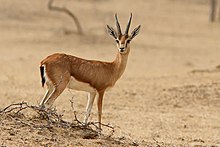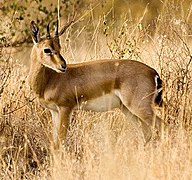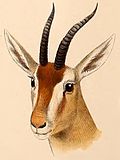| It has been suggested that this article be split into multiple articles. (discuss) (March 2024) |
| Gazella Temporal range: Miocene-Recent 14–0 Ma PreꞒ Ꞓ O S D C P T J K Pg N | |
|---|---|

| |
| Chinkara from Thar Desert, Rajasthan, India | |
| Scientific classification | |
| Domain: | Eukaryota |
| Kingdom: | Animalia |
| Phylum: | Chordata |
| Class: | Mammalia |
| Order: | Artiodactyla |
| Family: | Bovidae |
| Subfamily: | Antilopinae |
| Tribe: | Antilopini |
| Genus: | Gazella Blainville, 1816 |
| Type species | |
| Capra dorcas (Linnaeus, 1758) | |
| Species | |
|
Several, see text | |
A gazelle is one of many antelope species in the genus Gazella /ɡəˈzɛlə/. There are also seven species included in two further genera; Eudorcas and Nanger, which were formerly considered subgenera of Gazella. A third former subgenus, Procapra, includes three living species of Asian gazelles.
Gazelles are known as swift animals. Some can run at bursts as high as 100 km/h (60 mph) or run at a sustained speed of 50 km/h (30 mph). Gazelles are found mostly in the deserts, grasslands, and savannas of Africa, but they are also found in southwest and central Asia and the Indian subcontinent. They tend to live in herds, and eat fine, easily digestible plants and leaves.
Gazelles are relatively small antelopes, most standing 60–110 cm (2–3.5 ft) high at the shoulder, and are generally fawn-colored.
The gazelle genera are Gazella, Eudorcas, and Nanger. The taxonomy of these genera is confused, and the classification of species and subspecies has been an unsettled issue. Currently, the genus Gazella is widely considered to contain about 10 species. One subspecies is extinct: the Queen of Sheba's gazelle. Most surviving gazelle species are considered threatened to varying degrees. Closely related to the true gazelles are the Tibetan goa, and Mongolian gazelles (species of the genus Procapra), the blackbuck of Asia, and the African springbok.
One widely familiar gazelle is the African species Thomson's gazelle (Eudorcas thomsonii), sometimes referred to as a "tommie". It is around 60 to 70 cm (24 to 28 in) in shoulder height and is coloured brown and white with a distinguishing black stripe. The males have long, often curved, horns. Like many other prey species, tommies exhibit a distinctive behaviour of stotting (running and jumping high before fleeing) when they are threatened by predators such as cheetahs, lions, African wild dogs, crocodiles, hyenas, and leopards.
Etymology and their name

Gazelle is derived from French gazelle, Old French gazel, probably via Old Spanish gacel, probably from North African pronunciation of Arabic: غزال ġazāl, Maghrebi pronunciation ġazēl. To Europe it first came to Old Spanish and Old French, and then around 1600 the word entered the English language. The Arab people traditionally hunted the gazelle. Later appreciated for its grace, however, it became a symbol most commonly associated in Arabic literature with human female beauty. In many countries in northwestern Sub-Saharan Africa, the gazelle is commonly referred to as "dangelo", meaning "swift deer".
Symbolism or totemism in African families
The gazelle, like the antelope to which it is related, is the totem of many African families. Some examples include the Joof family of the Senegambia region, the Bagananoa of Botswana in Southern Africa (said to be descended from the BaHurutshe), and the Eraraka (or Erarak) clan of Uganda. As is common in many African societies, it is forbidden for the Joof or Eraraka to kill or touch the family totem.
Poetry
One of the traditional themes of Arabic love poetry involves comparing the gazelle with the beloved, and linguists theorize ghazal, the word for love poetry in Arabic, is related to the word for gazelle. It is related that the Caliph Abd al-Malik (646–705) freed a gazelle that he had captured because of her resemblance to his beloved:
O likeness of Layla, never fear!
For I am your friend, today, O wild gazelle!
Then I say, after freeing her from her fetters:
You are free for the sake of Layla, for ever!
The theme is found in the ancient Hebrew Song of Songs. (8:14)
Come away, my beloved,
and be like a gazelle
or like a young stag
on the spice-laden mountains.
Species
For gazelle species by population, see List of even-toed ungulates by populationThe gazelles are divided into three genera and numerous species.
Prehistoric species
Fossils of genus Gazella are found in Miocene, Pliocene and Pleistocene deposits of Eurasia and Africa, which occupuied a broader distribution that modern members of the genus. The earliest members of the genus are known from the Middle Miocene of Africa, around 14 million years ago with members of the genus inhabiting Europe from the Late Miocene until their extinction in the region during the Early Pleistocene around 1.8 million years ago.
- Genus Gazella
- Gazella borbonica - Early Pleistocene Europe
- Gazella capricornis - Miocene Asia
- Gazella harmonae - Pliocene of Ethiopia, unusual spiral horns
- Gazella praethomsoni - Pliocene Africa
- Gazella negevensis - Early Miocene Asia
- Gazella thomasi - Thomas's gazelle
- Gazella vanhoepeni - Pliocene Africa
- Subgenus Vetagazella
- Gazella altidens
- Gazella blacki - Pliocene Asia
- Gazella deperdita - Late Miocene Europe
- Gazella dorcadoides - Middle Miocene Asia
- Gazella pilgrimi - Late Miocene Europe
- Gazella gaudryi - Middle Miocene Eurasia
- Gazella kueitensis - Pliocene Asia
- Gazella lydekkeri - Mid to Late Miocene Asia
- Gazella paotehensis - Middle Miocene Asia
- Gazella paragutturosa - Pleistocene Asia
- Gazella parasinensis - Pliocene Asia
- Gazella praegaudryi - Pleistocene Africa
- Gazella sinensis - Pliocene Asia
- Gazella brianus - Pliocene Asia
- Subgenus Gazella
- Gazella janenschi - Pliocene Africa
- Subgenus Trachelocele
- Gazella atlantica - Pleistocene Africa
- Gazella tingitana - Pleistocene Africa
- Subgenus Deprezia
- Gazella psolea - Pliocene Africa
Gallery
-
 Grant's gazelle (male)
Grant's gazelle (male)
-
 Mhorr gazelle
Mhorr gazelle
-
 Cuvier's gazelle (female)
Cuvier's gazelle (female)
-
 Thomson's gazelle (male)
Thomson's gazelle (male)
-
 Speke's gazelle (female)
Speke's gazelle (female)
-
Goitered gazelle (females and young)
-
 Chinkara (female)
Chinkara (female)
-
 Dorcas gazelle (female)
Dorcas gazelle (female)
-
 Red-fronted gazelle
Red-fronted gazelle
-
 Mountain gazelle (male)
Mountain gazelle (male)
-
 Soemmerring's gazelle (females)
Soemmerring's gazelle (females)
-
 Slender-horned gazelle (male)
Slender-horned gazelle (male)
-
Gazelles on one of the vases made for the Alhambra palace
References
- Wilson, D. E.; Reeder, D. M., eds. (2005). Mammal Species of the World: A Taxonomic and Geographic Reference (3rd ed.). Johns Hopkins University Press. ISBN 978-0-8018-8221-0. OCLC 62265494.
- "Gazella". Merriam-Webster.com Dictionary. Merriam-Webster.
- "Gazelle". The Columbia Electronic Encyclopedia, 6th ed. 2007, Columbia University Press.
- Eva Verena Bärmann; et al. (2013), "The curious case of Gazella arabica", Mammalian Biology - Zeitschrift für Säugetierkunde, 78 (3): 220–225, Bibcode:2013MamBi..78..220B, doi:10.1016/j.mambio.2012.07.003
- "gazelle | Etymology, origin and meaning of gazelle by etymonline". www.etymonline.com. Retrieved 10 February 2023.
- Skeat, Walter W. (1910). "gazelle". An Etymological Dictionary of the English Language (4th ed.). Oxford: Clarendon Press. p. 236.
- ^ "gazelle". CNRTL.
- "Definition of GAZELLE". www.merriam-webster.com. Retrieved 23 February 2023.
- Behrens-billAbouseif, Doris (1999). Beauty in Arabic culture (Illustrated ed.). Markus Wiener Publishers. p. 53. ISBN 9781558761995.
- Jokha Alharthi (PhD), (Sultan Qaboos University, College of Arts and Social Sciences - Arabic Department) https://www.researchgate.net/publication/288181275_The_Representation_of_the_Beloved's_Body_in_classical_Arabic_Poetry Note in particular pages 7 and 8 of this (linked-to) paper published at a conference in 2015.
- "Dangelo (swift deer)". YouTube. 21 December 2020. Archived from the original on 5 December 2021.
- Faye, Louis Diène, Mort et naissance: le monde Sereer, Nouvelles Éditions africaines (1983), p. 74, ISBN 9782723608688
- ^ Gastellu, Jean-Marc (1981). L'égalitarisme économique des Serer du Sénégal (in French). IRD Editions. p. 130. ISBN 978-2-7099-0591-6.
- Chidester, David; Kwenda, Chirevo; Petty, Robert; Tobler, Judy; Wratten, Darrel (7 August 1997). African Traditional Religion in South Africa: An Annotated Bibliography: An Annotated Bibliography. ABC-CLIO. p. 341. ISBN 978-0-313-03225-7.
- ^ Roscoe, John, The Northern Bantu: An Account of Some Central African Tribes of the Uganda Protectorate, The University Press (1915), p. 262
- ^ Necipoğlu, Gülru (1997). Gülru Necipoğlu (ed.). Muqarnas: An Annual on the Visual Culture of the Islamic World (Illustrated ed.). BRILL. ISBN 9789004108721.
- "Antilopinae". Retrieved 1 July 2008.
- Bellucci, Luca; Sardella, Raffaele (January 2015). "The last Antilopini bovids from the Early Pleistocene of Italy". Quaternary International. 357: 245–252. Bibcode:2015QuInt.357..245B. doi:10.1016/j.quaint.2014.11.024.
- Solounias, N.; Moelleken, S.M.C.; Plavcan, J.M. (1995). "Predicting the diet of extinct bovids using masseteric morphology". Journal of Vertebrate Paleontology. 15 (4): 195–805. Bibcode:1995JVPal..15..795S. doi:10.1080/02724634.1995.10011262.
- ^ Geraads, D.; et al. (2012). "Pliocene Bovidae (Mammalia) from the Hadar Formation of Hadar and Ledi-Geraru, Lower Awash, Ethiopia". Journal of Vertebrate Paleontology. 32 (1): 180–197. Bibcode:2012JVPal..32..180G. doi:10.1080/02724634.2012.632046. S2CID 86230742.
- Tchernov, E.; Ginsburg, L.; et al. (1987). "Miocene mammals of the Negev (Israel)". Journal of Vertebrate Paleontology. 7 (3): 284–310. Bibcode:1987JVPal...7..284T. doi:10.1080/02724634.1987.10011661.
- Geraads, D.; Raynal, J.; Sbihi-Alaoui, F. (February 2010). "Mammalian faunas from the Pliocene and Pleistocene of Casablanca (Morocco)". Historical Biology. 22 (1–3): 275–285. Bibcode:2010HBio...22..275G. doi:10.1080/08912960903458011. S2CID 128756698.
- Sponheimer, M.; Reed, K.E.; Lee-Thorp, J.A. (June 1999). "Combining isotopic and ecomorphological data to refine bovid paleodietary reconstruction: a case study from the Makapansgat Limeworks hominin locality". Journal of Human Evolution. 36 (6): 705–718. Bibcode:1999JHumE..36..705S. doi:10.1006/jhev.1999.0300. PMID 10330334.
- ^ Khan, A. (2009). "Mammalian new remains from chinji" (PDF). The Journal of Animal and Plant Sciences. 19 (4): 224–229. Retrieved 14 August 2022.
- Chen, G. (1997). "Gazella blacki Teilhard and Young, 1931 (Bovicae, Artiodactyla, Mammalia) from the Late Pliocene of Hefeng, Jingle District, Shanxi Province". Vertebrata PalAsiatica. 35 (3): 189–200. Retrieved 14 August 2022.
- Merceron, G.; de Bonis, L.; et al. (February 2005). "Dental microwear of fossil bovids from northern Greece: paleoenvironmental conditions in the eastern Mediterranean during the Messinian" (PDF). Palaeogeography, Palaeoclimatology, Palaeoecology. 217 (3–4): 173–185. Bibcode:2005PPP...217..173M. doi:10.1016/j.palaeo.2004.11.019.
- ^ Khan, M.A.; Asim, M.; et al. (August 2021). "New remains of Gazella (Bovidae) from Middle Miocene, Pakistan". Arabian Journal of Geosciences. 14 (17): 1703. Bibcode:2021ArJG...14.1703K. doi:10.1007/s12517-021-07885-8. S2CID 236948573.
- Bouvrain, G. (1996). "The gazelles from the late Miocene of Macedonia, Greece". Neues Jahrbuch für Geologie und Paläontologie. 199 (1): 111–32. doi:10.1127/njgpa/199/1996/111.
- Meng, X.; Zhu, D.; et al. (September 2010). "Late Cenozoic stratigraphy and paleomagnetic chronology of the Zanda Basin, Tibet, and records of the uplift of the Qinghai-Tibet Plateau". Acta Geologica Sinica. 82 (1): 63–72. doi:10.1111/j.1755-6724.2008.tb00325.x. S2CID 128749824.
- Leslie, D.M. (July 2010). "Procapra picticaudata (Artiodactyla: Bovidae)". Mammalian Species. 42 (861): 138–148. doi:10.1644/861.1. S2CID 20998647.
- ^ Vislobokova, I. (2005). "On Pliocene faunas with Proboscideans in the territory of the former Soviet Union". Quaternary International. 126–128: 93–105. Bibcode:2005QuInt.126...93V. doi:10.1016/j.quaint.2004.04.017.
- Vislobokova, I.; Dmitrieva, E.; Kalmykov, N. (1995). "Artiodactyls From the Late Pliocene of Udunga, Western Trans-Baikal, Russia". Journal of Vertebrate Paleontology. 15 (1): 146–159. Bibcode:1995JVPal..15..146V. doi:10.1080/02724634.1995.10011214.
- Fillion, E.N.; Harrison, T.; Kwekason, A. (June 2022). "A nonanalog Pliocene ungulate community at Laetoli with implications for the paleoecology of Australopithecus afarensis". Journal of Human Evolution. 167: 103182. Bibcode:2022JHumE.16703182F. doi:10.1016/j.jhevol.2022.103182. PMID 35428490. S2CID 248141011.
External links
 Quotations related to Gazelles at Wikiquote
Quotations related to Gazelles at Wikiquote
| Taxon identifiers | |
|---|---|
| Gazella |
|















